LP 30/2020 Rediscussing Piracy in the Gulf of Guinea
The risk of pirate attacks persists in the Gulf of Guinea, affecting some of the entered ships. On 5 March 2020, a vessel under the Club’s war risk cover has been attacked and boarded by armed pirates shortly after it left the Lagos Port, Nigeria. Unable to prevent the pirates from boarding, the crew members withdrew to the citadel and stayed there for over 10 hours until confirming that the pirates have left. The ship was then escorted by the Nigeria Navy to the Lagos waters for investigation. Fortunately, no one was hurt in the attack.
A similar incident took place on the same day where an oil tanker was attacked 43NM south of Cotonou, Benin. The pirates fled as a patrol ship approaches. The majority of crew have managed to shelter in the citadel with one person unaccounted for.
I. High risk in the Gulf of Guinea
The Joint War Committee has updated the War Listed Areas to JWLA-024 on 17 May 2019 to include the coastal waters up to 12NM offshore Nigeria, Benin and Togo, as well as the waters of the Nigerian, Beninese and Togolese Exclusive Economic Zones north of Latitude 3°N.
According to IMO’s Piracy and Armed Robbery module within its GISIS, there have been a total of 154 incidents in West African waters from 1 January 2012 to 13 March 2020. 121 of them were within JWC listed areas, 33 were not and 23 incidents took place near Latitude 3°N. It’s obvious that the regions with active pirates have been expanding and there’s no guaranteed safety even out of the JWC listed areas.
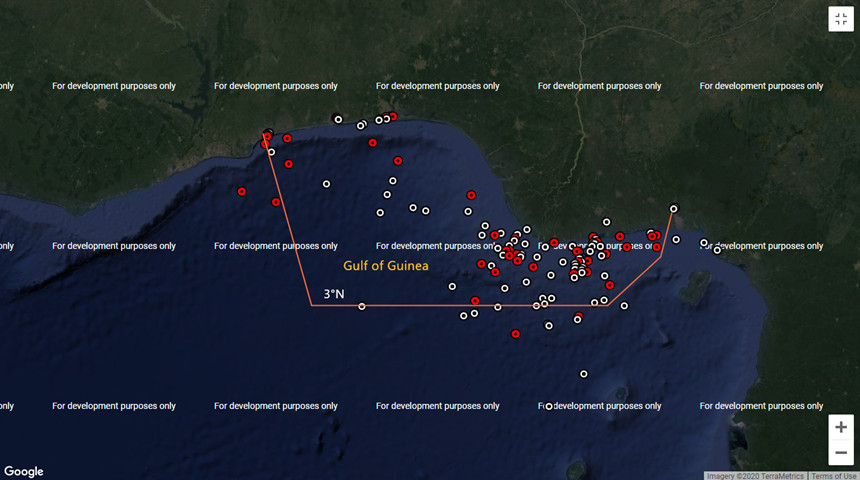
II. Summary on piracy incidents
The International Chamber of Commerce International Maritime Bureau (IMB) reports 132 incidents of piracy and armed robbery against ships in the GOG in 2019. While there’s a 11% decline on overall incidents than the statistics in 2018, the number of kidnappings has hit the record high for the last 11 years. The region has seen 3 crew kidnaps and 6 boarding incidents in the first 2 months of 2019 alone.
Pirates in the region were taking oil tankers as the main target, but a variety types of vessels are now under attack with the crew being threatened in a brutal and devastating way. Some kidnapped seafarers may be murdered once they are considered useless. Again, the Club would like to call on member shipowners to exercise vigilance and take necessary anti-piracy measures in advance.
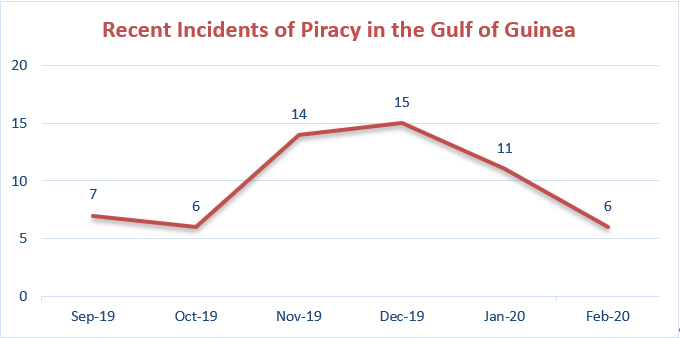
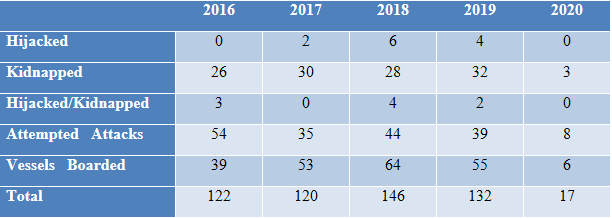
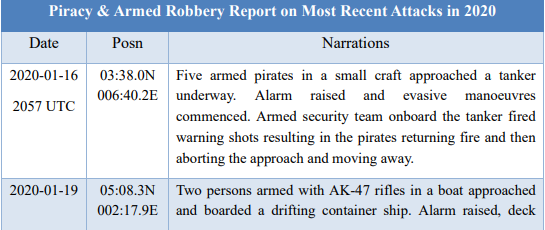
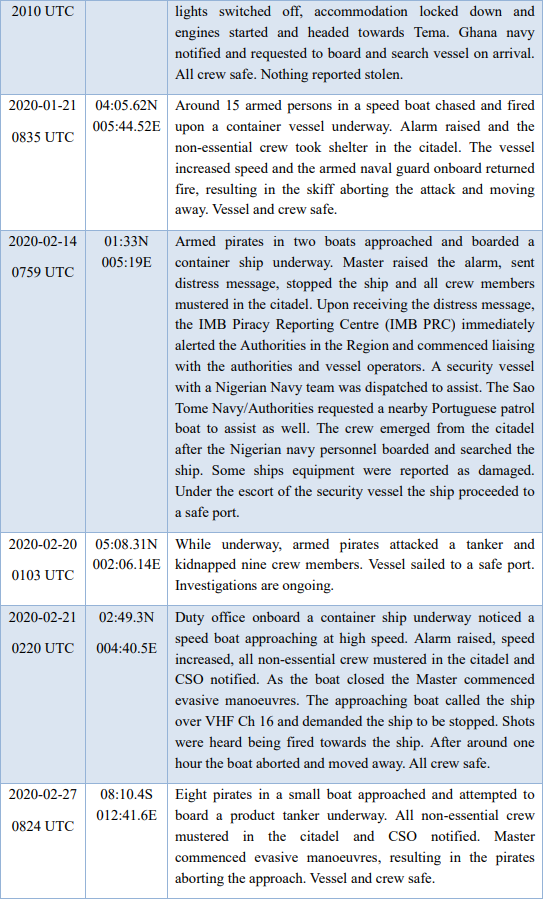
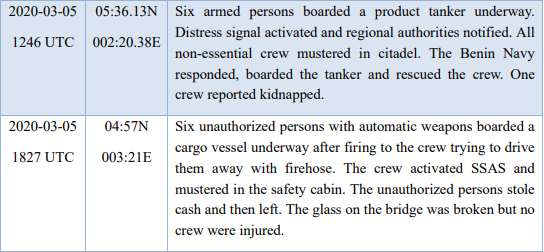
III. Advice to Members
IMO and the shipping industry at large have offered some practical guidance on counter-piracy efforts. The Club, looking at the region for piracy risks, has also provided some advice to the Members through previous circulars. Concerned with the recent incidents on March 5, the Club would like to once again remind owners on the following ship protection measures for voyages in the GOG region.
1. Prior to entering the area, conduct threat and risk assessment, review Ship Security Plan and take prevention measures as per the Global Counter Piracy Guidance for Companies, Masters and Seafarers and the 3rd Edition of Interim Guidelines for Owners, Operators and Masters for protection against piracy in the Gulf of Guinea region. The crew on the above-mentioned ship remained intact partly due to the fact that best practices were followed: good planning → regular drills → proper counter measures → watchkeeping with enhance vigilance.
2. Make detailed anti-piracy planning on the measures to take under navigational, anchoring and berthing scenarios. The crew should be fully briefed on the preparations. Drills should be conducted as per the emergency management plan to make all crew understand the required action in the event of an attack. Procedures for entering the citadel/safe muster point should be identified with drills regularly carried out.
3. Report to MDAT-GOG in accordance with requirements in the Maritime Security Chart Q6114 (tel: +33(0)2 98 22 88 88 / e-mail: This email address is being protected from spambots. You need JavaScript enabled to view it.). MDAT-GOG will be able to disseminate warnings and advisories of incidents within the region and offer help in the event of emergencies.
4. Sound the previously determined alarm to inform the crew of mustering at the citadel if unable to prevent the pirates from boarding. As the last layer of defence, it’s a proven fact that the citadel/safe muster point can effectively prevent kidnaps. Such a space should be carefully selected to prevent forceful entry of the pirates with a hardened door, a ventilation system that can be controlled from the inside and unbreakable from the outside as well as external communication equipment, sanitation and fire separation facilities.
In fact, without equipment to communicate with and monitor the outside, the crew would be exposed to dangers when coming out not knowing the situation. Therefore, apart from essentials like food, water, medicine and emergency power supply, it will be prudent to equip the citadel with two sets of communications (ideally VHF and satellite) and CCTV which allows monitoring of the progress of the attack from the inside. Detailed considerations can be found in BMP5 and Guidelines for the Functional Design of Anti-Piracy Security Cabins for Chinese Ships by China MSA.
While ships sailing in high risk areas without such communication and threat detection equipment, the following is recommended to minimize the possibility of crew being kidnapped.
Prepare a detailed plan for the use of citadel with considerations on the muster procedures, the signals to identify rescue forces and how to exit without knowing the location of penetrators.
If conditions permit, stay in the citadel until rescue arrives but be aware that rescues may not arrive at all. The location of the attack, the ship’s distance to shore and the response time of navy/military forces all matter to the time spent in the citadel.
Make sure no penetrators are at the entrance/exit of the citadel before going out for detection. Have as few crew members out as possible and someone should stand by next to the entrance so that dangers can be kept out as soon as the detecting team comes back.
5. Armed security has played a large role in preventing pirate attacks in Somalia, but unlike ships that sail in open seas in Somalia, ships sailing in the GOG will inevitably enter the waters of coastal countries. However, foreign private armed security on ships will be denied entry in almost all coastal countries and navy or marine police can be employed only by authorized security companies. The current practice is that an unarmed maritime security liaison officer (MSLO) who meets the visa requirements of the coastal country will be sent on board responsible for coordinating between the ship and the navy/police forces.
Nigerian authorities have disallowed any form of armed forces on merchant vessels in their territorial waters, including Nigerian navy and marine police. Only escorting vessel commanded by its navy is allowed. Members do need to employ security companies after the risk assessment are advised to first contact local agents/correspondents to obtain accurate information. Conduct due diligence when selecting a private-owned security company and follow flag state regulations and the IMO MSC/Circ.1405- Revised Interim Guidance to Shipowners, Ship Operators and Shipmasters on the Use of Privately Contracted Armed Security Personnel on Board Ships in the High Risk Area to avoid the additional risk of ships being detained or fined.
6. Be fully prepared to prevent the pirates from boarding. The crew will be safe for the moment as long as they can keep the pirates off the ship. Following the Global Counter Piracy Guidance for Companies, Masters and Seafarers, deploy razor wire, water spray deterrence and other physical barriers. Doors and hatches providing access to the bridge and accommodation should be locked from the inside. Install anti-pirate equipment properly on the sides and if it’s removed while in port, make sure it’s restored at departure to prevent any chance of attacks.
7. Ships without berthing plans would normally drift in waters 200NM from the coast; however, attacks have been reported in an expanded area of 200-300 NM. Proper lookout and watchkeeping should always be practiced with the engine on stand-by.
8. Avoid entering ports at night and if unavoidable, turn off AIS and navigation lights to prevent the glow of lighting attracting pirates. However, make sure the AIS is on while under attack.
9. Consider using secure anchorage areas that guarded by patrol ships when waiting offshore and maintain a good watch with vigilance. Armed security has been mandatory in e.g. secure anchorage and STS anchorage off the Lagos Port and Benin.
10. Do not confront the pirates, especially those heavily armed ones if under attack. Proceed at maximum speed and deter skiffs from lying alongside the ship by avoidance manoeuvres and alterations of helm. The master should immediately activate SSAS and emergency alarm and ask for help as per the emergency communication plan.
11. Keep a proper visual lookout, which is the most effective method of ship protection according to the Global Counter Piracy Guidance. It can help identify a suspicious approach or attack early on, allows defenses to be deployed and, can serve as an effective deterrent to would-be attackers. Also, the crew can be left with adequate time to take shelter.
12. Following any attack or suspicious activity, it’s vital to report not only to companies and flag states, but also to IMB PRC (Mail: This email address is being protected from spambots. You need JavaScript enabled to view it./Tel: +60 3 2031 0014) using provided formats, which will allow the agency to determine piracy prone areas, evaluate piracy strategies and issue warnings to ships that may be affected.
Note that Nigeria and the GOG are excluded to war risk cover as illustrated in JWLA-024, member shipowners are advised to arrange held cover for ships sailing to these areas and also consider K&R insurance. For more information about war risks, please contact CPI Hull Department at This email address is being protected from spambots. You need JavaScript enabled to view it..
IV. Counter-piracy Aide Memoire
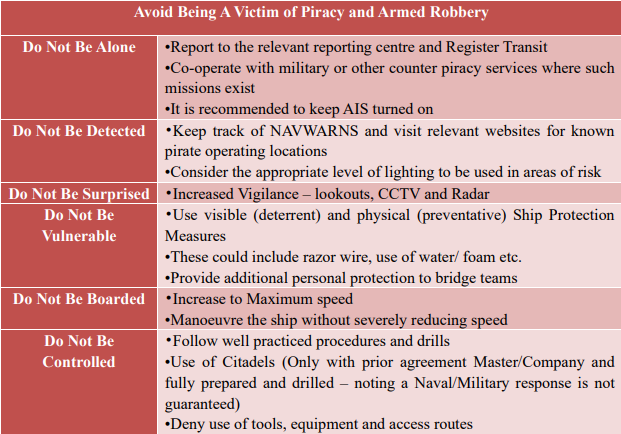
For more information, please contact your manager at the Club.
